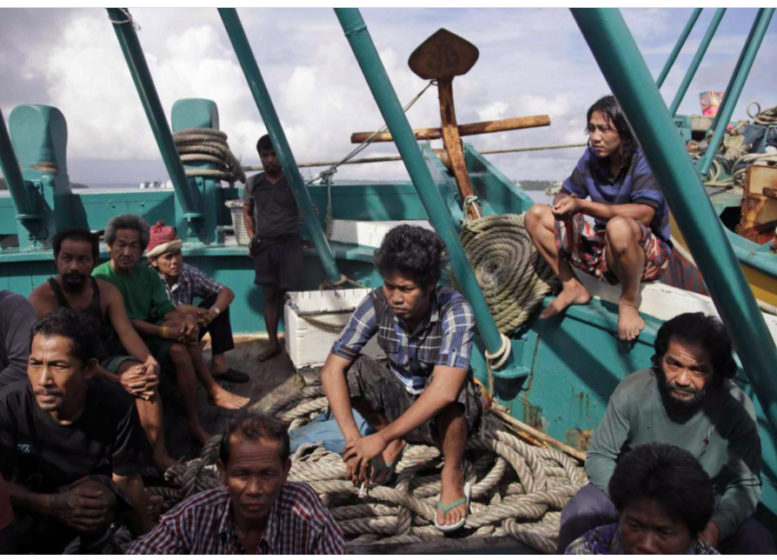Between 2014 and 2016, Greenpeace had been tracking Thailand’s rogue fishing vessels, and found that as many as 76 vessels with Thai flags had moved their operations to the Saya de Malha Bank area off the coast of east Africa to avoid being policed on illegal unreported and unregulated (IUU) fishing, and slave seafaring. Despite all international pressure on Thailand, its human rights abuses in the fishing industry have been persisting on ships that actively fish in remote and unpoliced waters.
Slave labor has been rampant on the fishing vessels that sustain the seafood industry in Thailand. According to the United Nations’ Food and Agriculture Organisation (FAO), Thailand is the world’s fourth-largest exporter of seafood, after China, Norway and Vietnam. Helpless migrant workers, mainly from Myanmar, Cambodia and Laos, and very poor Thais, are being lured onto fishing vessels with the assurance of a well-paid job, although most claim to have never received a salary because of the exorbitant fees they have had to pay up first.
The Human Rights Watch documents murders on the high seas, forced drug use and beatings, and says migrants are being trafficked to work on Thai boats, prevented from changing employers, not paid on time, and paid less than the minimum wage. The report documents multiple cases of physical abuse and violence against workers on boats. The report indicates men who attempt to escape are frequently beaten or killed, and the other workers are being forced to watch the punishments.
Slavery, trafficking, murder and corruption at all levels of the Thai government are still pervasive in Thailand’s billion-dollar fishing industry, despite arrests linked to human rights abuses. The Thai government introduced reforms to clean-up the country’s US$6.5 billion seafood fishing industry after revelations about seaborne forced labor abuses that prompted the European Union to warn Thailand it could face a ban on its seafood. America has placed Thailand on its “Tier 2” watch list, one rung above the worst rating in its latest Trafficking In Persons (TIP) report. Seafood sellers in Australia have declared they would not buy seafood from Thai suppliers who take seafood from slave labor boats, and where other abuses occur.
Mongkol Sukcharaoenkana, a representative of Thailand’s National Fisheries Association, said the industry had used illegal labor “in the past” but no longer does. “Every problem has been fixed by the current government.” But Brad Adams, Asia director at Human Rights Watch, urged Western governments to keep the pressure on Thailand, and make sure reforms are not just window-dressing. “No one should be fooled by regulations that look good on paper but are not properly enforced.”
“In an industry that relies heavily on migrant labor – more than 90% of those working in the fishing sector are from neighboring countries, many of them trafficked. It is the government’s job to create a framework that protects migrant workers both on the ground and at sea. Yet Thailand has failed to implement a strategy, putting millions of workers at unnecessary risk,” claims migrant rights activist Andy Hall.
Drug money is laundered to cover up its illegal origins, just as slave-labor seafood is also covered up. The captive workers sweat it out in unregistered “ghost ships.” Their catch is transferred to a large motherboat stationed out in the far seas where it is mixed with fish from other vessels before being off-loaded at the docks.
“More than 25,000 fishing vessels are legally registered by Thailand. Each one should be outfitted with a GPS-powered monitoring system,” argues Steve Trent, the Environmental Justice Foundation’s Director. “For just a couple of thousand dollars a year, an authority can monitor the exact locations of boats, which have benefits for both fisheries management and ensuring the safety of crews,” Trent said. “There is absolutely no excuse for a country as developed as Thailand not to employ this very basic technology.”
Fishermen in Ranong, Thailand say that that reforms, coupled with decades of overfishing and ecological destruction that have pushed fish stocks to the brink mean fisherfolk are increasingly unable to make a living. Instead, they are increasingly turning to another line of business called people trafficking because right now it is very difficult to find fish in the Gulf of Thailand. A local boat owner told the Guardian that he knew of 10 boats operating from the same port where he works, carrying 12,000 Rohingya migrants a month. These migrants, he said, are worth around $24M in ransom money.
